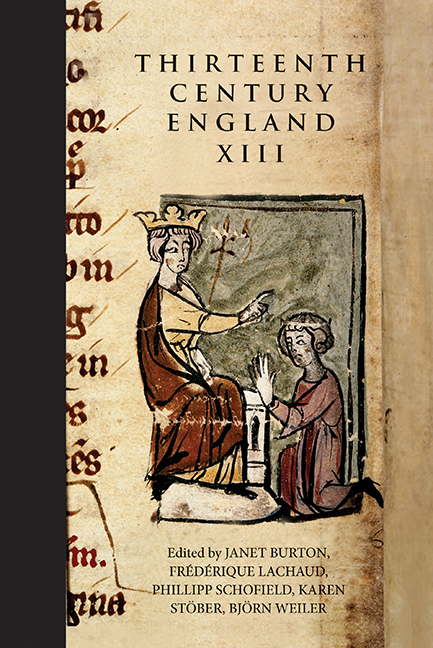Book contents
- Frontmatter
- Contents
- List of Illustrations
- Preface
- Contributors
- Abbreviations
- Political Ideas and Dialogue in England in the Twelfth and Thirteenth Centuries
- Peripatetic and Sedentary Kingship: The Itineraries of John and Henry III
- Peter of Aigueblanche's Support Network
- A Captive King: Henry III between the Battles of Lewes and Evesham, 1264–5
- The Conflictus inter Deum et Diabolum and the Emergence of the Literature of Law in Thirteenth-Century England
- Prosecuting Ravishment in Thirteenth-Century England
- John of Crakehall: The ‘Forgotten’ Baronial Treasurer, 1258–60
- Credit Finance in Thirteenth-Century England: The Ricciardi of Lucca and Edward I, 1272–94
- (Socio)linguistic Realities of Cross-Channel Communication in the Thirteenth Century
- The Treaties of Paris
Credit Finance in Thirteenth-Century England: The Ricciardi of Lucca and Edward I, 1272–94
Published online by Cambridge University Press: 15 September 2017
- Frontmatter
- Contents
- List of Illustrations
- Preface
- Contributors
- Abbreviations
- Political Ideas and Dialogue in England in the Twelfth and Thirteenth Centuries
- Peripatetic and Sedentary Kingship: The Itineraries of John and Henry III
- Peter of Aigueblanche's Support Network
- A Captive King: Henry III between the Battles of Lewes and Evesham, 1264–5
- The Conflictus inter Deum et Diabolum and the Emergence of the Literature of Law in Thirteenth-Century England
- Prosecuting Ravishment in Thirteenth-Century England
- John of Crakehall: The ‘Forgotten’ Baronial Treasurer, 1258–60
- Credit Finance in Thirteenth-Century England: The Ricciardi of Lucca and Edward I, 1272–94
- (Socio)linguistic Realities of Cross-Channel Communication in the Thirteenth Century
- The Treaties of Paris
Summary
The thirteenth century has been associated with a ‘commercial revolution’ and the beginnings of a money economy. An important part of this was the increasing involvement of Italian merchant societies in trade and credit provision in Northern Europe and England. The Lucchese were among the first Italians to break into the markets of Northern Europe, via the fairs of Champagne and then to London. Lucca was famed for its silk industry and from the mid-1240s Lucchese merchants appear in the English sources as suppliers of silks and other fine cloths to the royal household, including members of the societas Riccardorum. The frequent delays in securing repayment for these goods from Henry III's impecunious government effectively turned the Lucchese into royal creditors, but it was during the Lord Edward's crusade that the Ricciardi society began to play a more active role in royal finance. The Ricciardi advanced £6,000 to Edward during the crusade and later acted as intermediaries in repaying some of the other debts incurred by the king. After his accession to the throne, Edward continued to employ the Ricciardi as his financial agents and, indeed, he incorporated them into the royal financial system. The relationship between Edward and the Ricciardi collapsed in 1294, but both Edward I and his son and grandson later developed ties to other Italian merchant societies, namely the Frescobaldi of Florence (c. 1299–1311) and the Bardi and Peruzzi (up to c. 1341), also of Florence.
The essence of the ‘Ricciardi system’ was relatively simple. The Ricciardi advanced sums in cash to the king or made payments to third parties at the king's command. Most of these advances and payments were arranged through the wardrobe, the chief financial department under Edward I. In return, the Ricciardi collected the customs duty on exports of wool, hides and wool-fells imposed from June 1275, and, when necessary, this was supplemented from other sources of royal revenue, such as the proceeds of taxation and payments from the treasury. In general, the Ricciardi would have funded most of the payments that they made to the king or on his behalf either from the income that they had already received from the customs and other royal revenues, or else from their own resources, which they would charge against later receipts.
- Type
- Chapter
- Information
- Thirteenth Century England XIIIProceedings of the Paris Conference, 2009, pp. 101 - 116Publisher: Boydell & BrewerPrint publication year: 2011

